
|
Go to Golden Mountain Table of Contents. Go to Chinese resources page. |
Content created: 2010-11-24 File last modified: Previous Tale Next Tale |

It was just another day at the Monastery of Golden Mountain until one of the monks came running in great alarm.
"What's the emergency?"
"A group of soldiers wants to camp at the monastery. The leader is a battalion commander (yíngzhǎng 营长) named Zhāng 张. He's really ferocious."
"That's terrible. This Zhāng person is famous for being unreasonable.
"Here he comes right now!"
"Hey old monk! Our army will be camping here. I hope you'll cooperate without any problems, understand?"
"Yes, all right"
"So, go and get us a hundred bundles of firewood."
"Um, please wait just a bit. Our monks are doing a major clean-up. They are unable to get firewood for you immediately."
"That's not good enough. When I want you to do something, you will do it immediately. Now get going."
So the monks who were cleaning the great temple hall were told to stop cleaning and go and fetch firewood for the army.
As the column of monks came back with the firewood, Commander Zhāng thought to himself, "Hmmm. These bald donkeys (tūlǘ 秃驴) are behaving well." 
Meanwhile the laboring monks were thinking to themselves, "Hmmm. That officer is really barbaric."
"What did you say?" shouted Commander Zhāng at a monk who mumbled his thoughts to himself as he walked. And he cracked his whip.
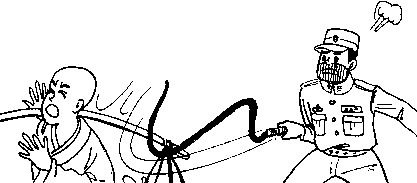
"Listen, you bald donkeys. I'll kick your heads off in a minute if you don't work seriously. I believe in Jesus Christ, not your stinking Buddha. You just be careful or I'll kick your Buddhist statues down the hill."
That night the army feasted boisterously in the monastery, eating and drinking to their hearts' content.
And the monks took private counsel together.
"What shall we do?"
"A monk running into a soldier can hardly expect to reason with him."
Suddenly they heard a voice chanting loudly outside.
"Oh dear! Wouldn't you know crazy monk would come back at a time like this?
One of the monks ran out to explain the military occupation to Miàoshàn.
"Miàoshàn, what is this crazy spell you're in? You been chanting loudly ever since you got back. You're likely to get a sound beating.
The soldiers also heard the chant.
"Who's chanting. It's deafening."
"Damn! What crazy monk is hollering like mad at midnight?"
Commander Zhāng went out to investigate. "Hey monk! What are you screaming like a demon (guǐ 鬼) about?"
Miàoshàn stopped. "Who are you?" he asked.
"Who am I?! Damn! Are you deliberately trying to be stupid? I'm warning you, if you keep screaming like a demon at midnight I'll beat you up good.
"So is it okay if I go to that hill to chant tomorrow?"
"It's far away. I probably won't hear it." thought Commander Zhāng.
"Fine," he said. "I believe in Christ (jīdū 基督), not stinking buddhas. Don't you stir up my temper."
The next night, despite the distance, the sound of chanting rang out over the compound, waking up monks and solders, and causing everyone to ask "Who is chanting?!"
"Damn!" muttered Commander Zhāng. He's waking me up again. It's strange his voice can be that loud."
On the third night it seemed louder yet.
"Damn. There it is again. I believe in God Jehovah (Yēhéhuá Shàngdì 耶和华上帝), but every day I am hearing Buddhist devils (móguǐmen 魔鬼们) chanting. This is unbearable. I must discipline him. I'll never again allow him to chant at night. 'Without being ruthless, one cannot be great!' (Wú dú bù zhàngfū 无毒不丈夫) Or so they say. 'If you must do it, don't stop half way!' (Yì bù zuò, èr bù xiū 一不做二不休). They say that too."
And so he called in an officer and told him to fetch Zhāng and Lǐ, his private goons. When they reported, he gave them their instructions.
Zhāng and Lǐ set forth to find the chanting monk. They located him at the edge of a cliff, snuck up behind him, and easily pushed him over.
Commander Zhāng was delighted, and the next night he retired with the happy thought that a good night's sleep lay ahead. But suddenly he heard the loud chanting of the crazy monk again.
He looked out the window and saw Miàoshàn, whom he knew to be dead.
"It's a ghost!" And he lay quaking under his coverlet all night long.
The next day Commander Zhāng confronted the goons Zhāng and Lǐ: "Damn! What did you two useless rice-eating machines do? Nothing!" And he pointed to the monk sitting out on the hillside.
"You'd better roll like eggs (gǔndàn 滚蛋), far far away!" 
"Somebody get in here."
"Sir?" Another soldier entered.
"Go and fetch me the crazy monk who is called Living Buddha."
The soldier went out to the hillside and brought back Miàoshàn.
"Hey, bald donkey! What is your name?" shouted Commander Zhāng.
"Why do you care?"
"You've been screaming like a demon these last few nights, disturbing the sleep of the whole camp. I warn you: no more screaming at night. Understand?"
"I'm a human being, and I do Buddhist chanting. How can you confuse that with a demon screaming? Furthermore, I've been chanting for several decades. Our monastery has had many military camps in it. Nobody has ever stopped my religious work. Nobody has ever said that I created a disturbance. Only you, sir, want to forbid me from doing Buddhist chanting."
"You are a rotten egg!" answered Commander Zhāng, bringing his hand down with a crash on the table. You crazy monk, screaming like a demon all over the hillside, not sleeping all night! You are deliberately making trouble with me. I am going to have you executed."
"I'm sorry, Officer, but this is my custom. I am not screaming like a demon. I am doing Buddhist chanting. Do you know about the Amitâbha Buddha? Do you believe in the existence of buddhas?"
"Your idol-worship (bài'ǒu 拜偶) is superstition (míxìn 迷信) mixed with feeblemindedness (yúchī 愚痴). Not only do I not believe in it, I am overturning it, forbidding you to chant."
"What shall I chant or believe if you forbid me to do Buddhist chants?"
The question surprised Commander Zhāng. "If I can convert this man to believe in Jesus," he thought, "he might have an influence on others."
"You may chant 'wǒ zhǔ Yēsū' (耶稣 my lord Jesus)'. Jesus is a savior. He was crucified to save the sinners. He is great and loving. Reciting his name will save you immediately. It is more effective than Buddhist chanting."
"So you want me to chant Yēshū (耶输 Jesus is beaten)?" 
"Yes. You may chant 'Yēsū' (耶稣 Jesus) from now on."
"Ah yes, now I remember."
"What do you remember?"
"When Shakyamuni Buddha was a prince, before he left his family, his wife had the name Yēshū Tuóluó 耶输陀罗. She later became Shakyamuni's disciple. She became a nun. Is that the Yēshū you mean?"
"Damn, this monk is stupid," thought Commander Zhāng.
"No. What I said was not that woman Yēshū 耶输 in your religion, but the Savior Yēsū 耶稣 in our religion."
"Oh, Yéshù (椰树 coconut tree). Yes. I know it. Isn't that the tall and long coconut tree?
"You crazy monk, or monk pretending to be crazy! Are you really not understanding or are you pretending? I am going to give you a good beating."
"I'm sorry, but I really don't understand. Please explain."
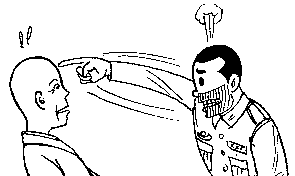
"Yēsū is the founder of the Christian religion (Jīdū jiào 基督教). I advise you not to believe in Buddhism or do Buddhist chants, but to switch to believing in our Jīdū (基督 Christ). Buddhist chanting is useless. If you have to chant, chant Yēsū Jīdū (耶稣基督 Jesus Christ) or 'Yēhéhuá Shàngdì' (耶和华上帝 Jehovah God). Now do you understand?"
"Oh yes. You want me to chant 'yānghuò Huá' (殃祸华 disaster befalls China) and 'Yēsū qídú' (耶稣奇毒 Jesus is extremely poisonous)." 
"What are you saying?!" shrieked Commander Zhāng.
"Jesus is extremely poisonous. Jesus is extremely poisonous. All right now! Interesting. But since you believe in Jesus Christ, why didn't your soldiers camp in Christian churches? Is it because Jesus is extremely poisonous and so you don't dare camp there when you can bully compassionate Buddhists instead?"
Commander Zhāng looked confused and annoyed.
"Religious freedom is a constitutional right," Miàoshàn continued. "Why are you forbidding me from doing Buddhist chants and forcing me to convert to Christianity and chant the name of Yēsū? That really is 'disaster befalling China'!"
"Enough! You are really asking for death. Guards! Take him out and beat him up!"
And so the guards appeared and beat up Miàoshàn and left him lying in the dirt, where his fellow monks found him and took him back to his quarters in the monastery.
Not long afterward, once again Commander Zhāng heard loud chanting on the evening air.
"Damnation! He must be made of iron. Those beatings still didn't kill him!" He paused in wonder. "Can it be that he really is a living buddha? I don't believe that. Well, I'll find some excuse to beat him to death tomorrow. Damn! This is driving me nuts!"
The next day Commander Zhāng ordered his men to bring in the Living Buddha, but they couldn't find him, so Commander Zhāng decided to leave the matter alone until he returned.
Meanwhile some of the army men were conferring among each other.
"I can't figure out why the commander hates the Living Buddha so much. The Living Buddha really hasn't done anything wrong."
"That's true. The Living Buddha is easy on people, and he has wonderful healing skills."
"That's true. Ābā's 阿八 arthritis was cured by him. So was Zhāng Ālǔ's 张阿鲁 tuberculosis."
"The real reason is that Commander Zhāng is a Christian and he despises Buddhists, especially the crazy ways of the Living Buddha."
"But he is really overdoing it."
Many days passed, and eventually Miàoshàn reappeared. One of the soldiers immediately warned him:
"Living Buddha, you're back! Commander Zhāng is waiting to have you beaten up again."
Miàoshàn's return was immediately reported to Commander Zhāng.
"This crazy monk is back?!" Commander Zhāng groaned. "I'll be bombarded again tonight. He really doesn't want to live!"
And sure enough, that night the chanting began again. Commander Zhāng lay in his bed and thought, "It's really difficult. There is no way I can handle this crazy monk. I hear most of the soldiers in the camp are quite respectful toward him, and call him 'Living Buddha.' The major reason is that he supposedly cures odd and difficult diseases for the soldiers. Damn! Could he really be a living buddha?
"No! The Bible says, 'You shall not believe in false gods.' I must not believe in this kind of false god. He is some kind of a devil (móguǐ 魔鬼). I must destroy this crazy monk."
As he thought about it, the chanting outside only seemed to grow louder, and Commander Zhāng pulled the comforter over his head to try to block out the sound.
The next day some of the soldiers spotted Miàoshàn walking in the monastery gardens in good spirits.
"Let's tease him. Hey! Living Buddha! Wait just a minute!"
"What's up?"
"Can you show us where Madam Āfān's 阿番 wine house is?"
"I don't know."
"Oh, don't pretend to be stupid. Didn't you stay there last month? There's nothing wrong with telling us about it."
"Amitâbha! You are much too serious with these words."
From his office Commander Zhāng spotted the soldiers and the monk. He also noticed a bucket of excrement left by an attendant not far from his door.
"Hmmm. The brothers are joking around with that crazy monk. Perhaps I'll going and give him a hard time too."
"Come on," said one of the soldiers, seizing Miàoshàn's hand. "Let's find some women to play with." Just then Commander Zhāng walked up with the bucket.
"Hey crazy monk!" As Miàoshàn turned around, Commander Zhāng turned over the bucket full of dung and smashed it down over Miàoshàn's head.
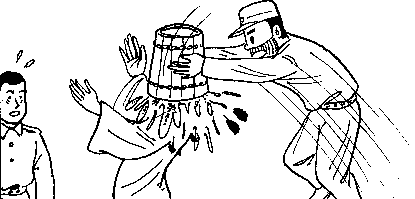
This insult exceeded what even his own soldiers could enjoy, however.
"Commander Zhāng really is arrogant!" they muttered. "How can he be so rude to a member of the sangha [clergy]?!"
Meanwhile Miàoshàn staggered off in a daze, the inverted bucked still on his head.
"Ha ha! The 'Living Buddha' is running off to town.'
A crowd gathered quickly, and as Miàoshàn stepped into the road a military car pulled up with a woman in it.
"Stop the car. That is my master, Living Buddha. Oh Master, what have they done to you?"
Miàoshàn stopped and lifted the dung bucket from his head. It was the division commander's wife.
"Madame Commander (shīzhǎng fūrén 师长夫人)!"
"Master, what has happened to you? Who is bullying you?"
"No-one is bullying me."
"Tell me Master, just who is it who dares to insult you to such a degree?"
"It's not important. Our bodies are actually excrement buckets, running around with faces and not stinking. How can this small amount of actual excrement matter?"
"Master, just say who it is who is so arrogant? You shouldn't have to bear this kind of insult."
"It doesn't matter. I don't mind at all."
But the woman was not satisfied. "This must have been done by some military official with power," she thought. And she ordered her driver to investigate the matter.
After he had asked around, the driver returned.
"Reporting to Madam Commander. Some soldiers said it was done by Commander Zhāng."
"What? This little Zhāng is merely a petty battalion commander. How dare he be so arrogant? He should be brought in and severely disciplined." Then she turned to Miàoshàn. "Master, please come to your disciple's house for some rest."
Meanwhile Commander Zhāng was hugely enjoying his prank, which seemed to him funnier and funnier the more he thought about it. Suddenly officers appeared sent by the division commander. They arrested him and took him to the division headquarters (shītuán 师团). He was immediately escorted into the commander's office, where he saw the division commander, his wife, and the crazy monk sitting behind a huge desk. The division commander looked furious.
"We will have you shot," said the division commander. "Take him out and execute him." And he banged his fist on the table.
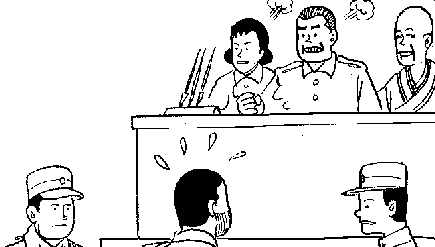
"Slow down a moment, Commander. Please don't do this." It was Miàoshàn who spoke. "We Buddhists don't harm crawling or flying creatures. So how can you have him killed because of me?" He dropped to his knees before the division commander and his wife.
"Master please stand up. As a disciple I can't bear your deference," said the division commander's wife, rushing to his side. "Master, how could you, as a superior person, kowtow to me, your disciple?"
"Commander, please forgive Commander Zhāng for my sake," Miàoshàn continued.
"Very well, but please get up. I don't deserve this bowing," said the division commander in embarrassment. Then he turned to Commander Zhāng. "Your death penalty is forgiven, but you cannot escape entirely. Your punishment will be one hundred strokes of the military paddle."
Immediately, Commander Zhāng was subjected to a severe beating. At length Miàoshàn could stand it no more:
"Stop the beating. I beg you, please don't continue the beating."
And so the division commander conceded, but he turned to Commander Zhāng and said, "Your worthless, dog-life is spared entirely by Living Buddha. Otherwise, you would not have survived. He has the compassionate heart of a buddha. Just think of the insults and vicious harm you gave Living Buddha. What overwhelming hatred did he inspire in you? Had Living Buddha been an ordinary monk, he would have been killed by you. You're doing bad things today again. Is any human supposed to behave this way?
"I am not partial to any religion. Honestly, the compassion, tolerance, peace and wisdom of Buddhism is unsurpassed. by any other religion. You are a devout Christian. You Christians also have slogans about love, freedom, equality, and so on. You say you love your enemies. These are just lies. Otherwise how can you justify your actions as what Christians should do?"
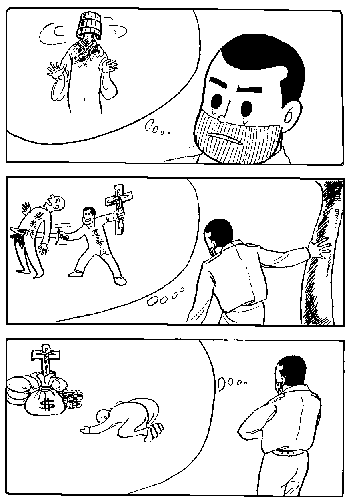
In rage, the division commander slapped him across the face, and then continued.
"If my wife had not discovered your acts today, I am afraid you would have become even more vicious. You running dog! Not only is my wife a disciple of Living Buddha; the wife of the prominent party leader (dǎngguó yuánxūn 党国元勋) Huáng Xīng 黄兴 is also a disciple of Living Buddha. Do you think they are willing to let their master innocently suffer insults and bullying while our soldiers are camping out at the Monastery of the Golden Mountain. If you had killed Living Buddha, I might have lost my life on your account.
"Attendants! Put him in jail for one month. His duties will be assumed by his assistant."
Five days passed, and then the Living Buddha returned to rescue Commander Zhāng by pleading with the division commander. As he released Zhāng, the officer admonished him again:
"This time, your escaping death and even being able to keep your post are due to the sincere pleading of Living Buddha on your behalf. He exemplifies the Buddhist principle of giving up oneself to save others. I hope you'll think about it carefully upon your return. You are also a religious man. Now get out!"
As he trudged home, Commander Zhāng thought back over all this. "You are also a religious man." "Think carefully about it." "Please forgive Commander Zhāng for my sake."
He asked himself if his own actions had been right, for example in mocking the monk with the dung bucket. He thought about Christians excluding outsiders and bullying others, using money and power instead of compassionate truth (bódà zhēnlǐ 博大真理) to induce people to become believers. And he thought of the greatness of Buddhism's compassionate tolerance (cíbēi rěnrù 慈悲忍辱) and self-sacrifice to save others (shějǐ jiùrén 舍己救人).
In the end Commander Zhāng concluded that he had been wrong. He rushed to find Miàoshàn and kneel before him.
"Master, I was wrong."
"What is this all about? Cut it out. People shouldn't see you like this."
The spirit of Buddhism is equal treatment of enemies and relatives, given without expecting any return. So the next day the Living Buddha quietly departed. Commander Zhāng no longer opposed Buddhism, and the monks at the Monastery of the Golden Mountain had some peace and quiet.
But one day a very large and painful tumor suddenly appeared on Commander Zhāng's chest. The doctors knew of no way to cure it. They didn't even know what kind of tumor it was. It went on for over a month, and prayers to Shàngdì (上帝 God) and to Yēsū 耶稣 Jesus) proved useless. Commander Zhāng realized that his only hope was the Living Buddha. "Living Buddha," he cried out to himself, "why haven't you come back to save me?"
Now the Living Buddha was all knowing, so he returned just when everybody was anxiously hoping he would. As he walked into the monastery one of the soldiers hailed him.
"Living Buddha, Commander Zhāng asks you to cure his disease," said the soldier.
"Yes. I know." And then he added, "But this is the result of his past actions of not believing in Buddhism, insulting the buddhas, and beating monks."
He found Commander Zhāng lying in his bed in great pain.
"Living Buddha! Please help me!"
"Your bad karma is much. This is the retribution you deserve," said Miàoshàn. But Commander Zhāng was delirious with pain.
Miàoshàn asked for several large bowls. Then he suddenly pulled out a huge shears and cut off the end of the tumor, filling the bowls with the material that spurted out. He sucked out the last of the material and spat it into the last of the bowls.
"Look at this," he said to one of the soldiers.
Commander Zhāng felt relieved as the pain drained away, and he gradually recovered his senses.
"It would have been the end of you if I had come two days later," Miàoshàn told him.
"It was certainly dangerous. Living Buddha sucked out two large bowls of purple and black pus," the soldier told Commander Zhāng.
"What? You say Living Buddha sucked the bloody pus from my tumor?!"
"Yes."
"Living Buddha is truly great, truly compassionate."
Meanwhile Miàoshàn was mixing his own saliva and nasal mucus into one of the bowls of pus. "Drink this and you'll get well," he said.
After a few days, Commander Zhāng's illness was entirely healed, and once again he could address his troops.
"Brothers, you all know the greatness and compassion of Living Buddha. I hope you will follow my lead, for henceforth I shall abide by Buddhism. Those who pledge to do so, raise you hands."
And the entire camp of soldiers all pledged to follow Living Buddha and became reverent Buddhists.
Return to top.
Previous Tale
Next Tale